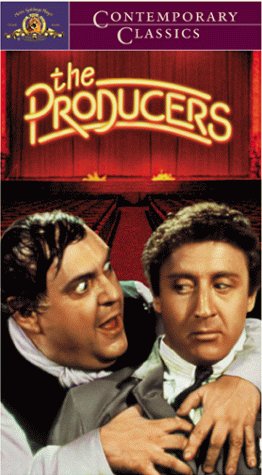
THE PRODUCERS
US, 1968, 88 minutes, Colour.
Zero Mostel, Gene Wilder, Dick Shawn, Kenneth Mars, Estelle Winwood, Christopher Hewitt, Andreas Voutsinas.
Directed by Mel Brooks.
The Producers won its writer director, Mel Brooks, an Oscar for the best original screenplay of 1969. The Producers is Mel Brooks' first film. He has since become quite famous with Blazing Saddles, Young Frankenstein, Silent Movie. He has also influenced Gene Wilder and Marty Feldman, who appeared in his films, to go out and write and direct their own. Brooks is noted for his zany kind of humour and his parody of stage and film. The Producers presents two Broadway men searching out and presenting the worst play ever written in order to make off with the capital invested in the production. Zero Mostel is a huge comedian with a face that continually makes us laugh. Gene Wilder, as his deadpan offsider, is very good too. There's much satire on money speculation and Broadway. And the pathos of their production Springtime For Hitler is well worth seeing.
In 2000 Brooks adapted the screenplay for Broadway and it was one of the biggest successes of all time.
1. Was this an enjoyable comedy? Good humour, good taste? To be appreciated by American audiences, New York audiences? The impression on overseas audiences? Why the differences?
2. What successful comedy ingredients did the film use, how well? The quality of the farcical situations? The humour and wit of the dialogue? Comic situations? Parody of producer films, parody of theatre types and situations? The parody of Hollywood musicals? The quality of slapstick? Illustrations which highlight the nature of all these aspects of the film?
3. The irony in the title and the lack of success as producers? How interesting was the plan in itself and our response to it? The theme of greed and trickery?
4. What tone did the opening give to the film? Max and the old ladies? False flattery, greed, self-deception, using people?
5. How interesting a character was Max? Zero Mostel’s style? Max and his Broadway reputation, the ladies, his acting apart all the time? Did he have any really human traits? His bullying of Leo, his using and tricking him? His response to Leo's project? Max as smart and being outsmarted? The court sequence? The irony of the ending? How much audience sympathy was there for him? Was he likeable or not?
6. How did Leo compare with him? Big man and small man? Intelligent man and practically smart man? The initial sequences of Leo as weak, hysterics, his memories of his unimaginative past? The enthusiasm of Max and the lunch, the walk in the park etc.? Leo's shrewdness, following Max yet leading him? His reactions to the production of the play? The impact of disaster on him? The court's sequence? The irony of their doing the same in gaol?
7. How effective was the satire on the Nazi author and on Nazism? The American Jewish background in which this was played out? How clever was the satire, how slapstick? Was there any pathos in the character of the author?
8. Springtime For Hitler: the satiric tones, whether it was in good taste or not, the Broadway style, the playgoers and their response, the background of the auditions and the humour in the character singing, the failure of the play and its turning to success? The use of comedy and farce in the play itself, the songs, LSD and his sending up the situations?
9. How important was the character of LSD? The type and the parody of the hippy type, his audition, the parody in his dancing and performance?
10. The satire in the director and his assistant? Reputation, character, the homosexual overtones, the affected nature of his work?
11. Which sequences were the best in the film? Why? Examples, the sequence of the musical, dancing and the parody of the thirties musicals?
12. What was the purpose of making this film, comedy, to entertain New York audiences, Jewish audiences? A comedy on greed, money, success, popular taste etc.?